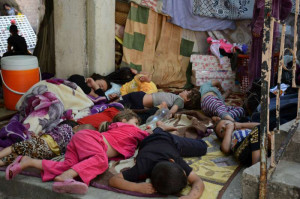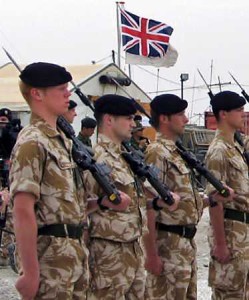Yesterday, the United Nations Human Rights Council (UNHRC) held a special session on Iraq to discuss the ongoing crisis and called for an immediate end to the acts of violence and abuses committed against civilians in Iraq, particularly against children and people from various ethnic and religious communities. “The reports we have received reveal acts of inhumanity on an unimaginable scale,” Flavia Pansieri, the Deputy High Commissioner for Human Rights, said in her opening remarks.

Members of an ethnic Yezidi family sleep in the shade in Shekhadi village, Iraq, after fleeing Sinjar. Photo: UNHCR/N. Colt
The UNHRC adopted a resolution requesting the Office of the High Commissioner for Human Rights (OHCHR) to urgently dispatch a mission to Iraq to investigate alleged violations and abuses committed by the so-called Islamic State in Iraq and the Levant (ISIL) and associated groups.
The resolution condemns “all violence against persons based on their religious or ethnic affiliation as well as violence against women and children”, including “unlawful killing, deliberate targeting of civilians, forced conversions, targeted persecution of individuals on the basis of their religion or belief (and) acts of violence against members of ethnic and religious minorities”. The resolution calls on the office of the UN new High Commissioner for Human Rights, Prince Ra’ad Zeid al-Hussein of Jordan, to dispatch investigators to Iraq to look into abuses carried out by the group that included the filmed beheading of US journalist James Foley. Investigators will update the UNHRC at its next regular session, which starts next week, and their full report is expected at the council’s annual session scheduled at the beginning of 2015.
Requested by Iraq and backed by Iran, the United States, the Arab Group and the European Union, the special session condemned “in the strongest possible terms” systematic violations and abuses of human rights and violations of international humanitarian law resulting from the terrorist acts committed by ISIL and associated groups “which may amount to war crimes and crimes against humanity…” Reports have gathered evidence on violations of international human rights and humanitarian law, including brutal persecutions of ethnic and religious groups, systematic and intentional attacks on civilians, forced displacement and use of child soldiers.





